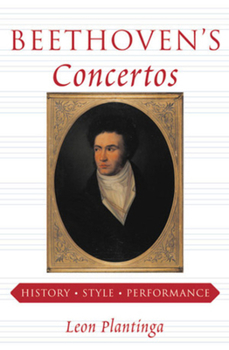Beethoven's Concertos: History, Style, Performance
Select Format
Select Condition 
Book Overview
Beethoven's piano and violin concertos rank among the most famous and beloved works in concert literature. The composer regared the piano concertos, which he himself premiered, as very personal expressions of his musical thought and perfomance style.
Format:Hardcover
Language:English
ISBN:0393046915
ISBN13:9780393046915
Release Date:January 1999
Publisher:W W Norton & Co Inc
Length:403 Pages
Weight:2.55 lbs.
Dimensions:10.0" x 1.5" x 6.8"
Customer Reviews
2 ratings
Deep analysis, period. Non-specialists beware!
Published by Thriftbooks.com User , 25 years ago
The kudos given this work by the above reviewers are well-deserved. Do not be misled, however, into thinking that an affection, or even a passion, for Beethoven guarantees your appreciation of Plantinga's sophisticated analysis. Do not buy this book if you do not have a fairly strong command of music theory and terminology.
Deep analysis for the non-specialist
Published by Thriftbooks.com User , 26 years ago
Leon Plantinga writes clearly and does not clutter his prose with arcane musicological terminology. Yet he presents insights into this music that cannot be obtained elsewhere. A separate booklet, included with the book, presents numerous examples in music type for those who wish to see the precise points in the scores mentioned in the text.





